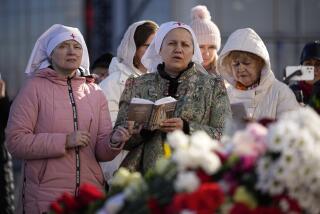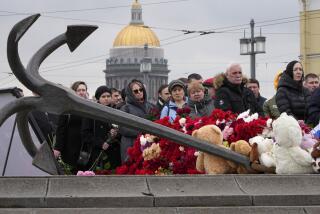Yeltsin Backers, Moscow Police Brace For Clash
- Share via
MOSCOW — Hundreds of thousands of Russian Federation leader Boris N. Yeltsin’s supporters face a potentially explosive showdown outside the Kremlin today with an army of riot police loyal to Soviet President Mikhail S. Gorbachev.
As of Wednesday night, the Yeltsin camp refused to cancel the planned rally despite a government ban on all demonstrations for three weeks and ominous warnings from the Soviet vice president and top law-enforcement officials that “public disorder” could result.
The Gorbachev administration, despite an emergency meeting of the government’s national security council Wednesday afternoon, remained equally immovable, ignoring a declaration by the Russian legislature on Wednesday that the ban on protests violates the constitution.
According to Moscow officials, the central government also authorized police and internal security troops numbering 50,000 to use tear gas, water cannon and nightsticks if needed.
The expected face-off between protesters and police reflects the escalating confrontation between Gorbachev and Yeltsin, the two titans of Soviet politics whose three years of public sparring appear to be degenerating into chronic enmity that could doom the country to prolonged chaos.
If the rally--scheduled to begin at 6 p.m. Moscow time (7 a.m. PST) on Manezh Square outside the Kremlin--turns violent, it will become the first large-scale, politically motivated clash in the Soviet capital since Gorbachev came to power in 1985.
In a sign of the widespread fear of bloodshed, both a high Moscow police official and a leader of the pro-Yeltsin movement that organized the rally appealed to Muscovites on Wednesday to remain peaceful.
Arkady Murashev, speaking for the Democratic Russia coalition, told viewers of the nightly news program on state television: “If, tomorrow, on the column’s route . . . you come up against fences or forcible blocking of the column’s march, we ask you to show restraint and not give in to possible provocations or allow any violent acts.”
Maj. Gen. Lev Belyansky of the Soviet Interior Ministry also called for calm, but earlier in the day he had warned, “Our people will act in accordance with the law, but the column will not pass.”
Within the Kremlin, however, officials were divided over the government’s tactics, according to one account of the continuing debate Wednesday night.
Liberals in Gorbachev’s office warned that if violence resulted, Soviet politics would be polarized further and the president’s position greatly weakened. Conservatives would be able to capitalize on it, they contended, and liberals, increasingly disenchanted with Gorbachev, would desert him completely.
Democratic Russia had originally called the rally to show support for Yeltsin on the opening day of a Russian Parliament session that is expected to challenge his leadership of the vast Russian Federation, the Soviet Union’s largest republic.
Conservative opponents have threatened to hit Yeltsin with either a no-confidence vote or, at least, harsh criticism of his inability thus far to improve Russia’s economy.
Yeltsin should be riding a wave of confidence after winning a 70% vote of support in the March 17 referendum for his proposal to create a popularly elected presidency in Russia--a post that would almost certainly go to him, theoretically giving him more legitimacy than Gorbachev, who was elected by Parliament.
But his radical positions, stormy temperament and recent attacks on Gorbachev, including a call earlier this month for people to “declare war” on the Soviet leader, have cost him support, even among some of his closest aides.
Gorbachev has generally been more subtle in his counterattacks, but his tolerance for the tactics used by Yeltsin and the Soviet left wing appears to be growing ever thinner.
In an extended television interview earlier this week, he never mentioned Yeltsin by name but said the Russian Congress opening today should examine its leadership’s political line, and he hinted that Yeltsin, while giving lip service to the idea of a united Soviet Union, actually seeks Russian independence.
Gorbachev also condemned the repeated mass rallies called in central Moscow this winter as unproductive, and he said the time has come to stop protesting and start working.
The leadership of the Russian Federation’s legislature argued Wednesday in its declaration condemning the ban on protests that the Soviet constitution guarantees the rights of free speech and assembly.
But police officials made it clear Wednesday that they will obey the Soviet government, not the Russian one, and the head of the Moscow KGB, the Soviet security police, warned that he would “act decisively” if the rally went ahead.
Rumors swept Moscow that armored vehicles would be used to halt the demonstration when several were spotted at a military base near the city center. But police denied repeatedly that they were intended for crowd control, and former Interior Minister Vadim V. Bakatin, now a member of the new national security council, said he expects buses and trucks to be placed at strategic spots to block off streets.
Public fears persisted despite the police reassurances that they intend no violence, including a headline in the Communist Party daily Pravda promising “There Will Be No Tear Gas.”
In contrast to the Pravda headline, the Moscow City Council’s newspaper, Couranty, published a front-page photo of rows of armored personnel carriers (APCs) accompanied by the dry question, “A Congress of APCs in Moscow?”
Rally organizers said they doubted that fear would keep people away, just as veiled warnings of danger failed to prevent a similar mass rally in February, 1990.
“Those who are afraid have already not been coming,” said Democratic Russia district leader Vladimir Kutukov, predicting that today’s rally would attract similar numbers to those at the last two anti-Gorbachev demonstrations held outside the Kremlin. Crowd estimates ranged upwards of 200,000.
On Wednesday night, police had already closed off Red Square with metal barriers, but there was no sign of unusual crowd control measures or large numbers of troops.
In Washington, State Department spokeswoman Margaret Tutwiler said that as a signatory to the Helsinki Accords, the Soviet Union is required to permit peaceful demonstrations, but the Kremlin has a right to make its own decisions concerning law enforcement.
“This is an internal matter of the Soviet Union, and there is just so far that I can go as far as delving myself into legitimate decisions that a sovereign government is making concerning it, whether we agree with those decisions or not,” Tutwiler said.
Times staff writer Norman Kempster in Washington contributed to this article.
More to Read
Sign up for Essential California
The most important California stories and recommendations in your inbox every morning.
You may occasionally receive promotional content from the Los Angeles Times.













